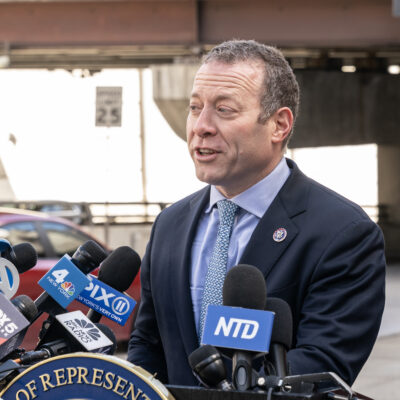White House, Democrats grow impatient with Netanyahu’s latest rebuff of Palestinian state
The Israeli prime minister made clear on Thursday he is prepared to ignore U.S. demands for a two-state solution

Sean Gallup/Getty Images
Israeli Prime Minister Benjamin Netanyahu speaking to the media on March 16, 2023.
Israeli Prime Minister Benjamin Netanyahu on Thursday offered his clearest statement yet that he will oppose any American efforts to create a Palestinian state, rebuffing President Joe Biden and senior U.S. officials who have made a two-state solution a key component of Washington’s response to the Israel-Hamas war.
“Israel needs security control [over] all territory west of the Jordan [River],” Netanyahu said Thursday in a news conference. “This collides with the idea of sovereignty. What can you do?” He said he had conveyed this attitude toward his American counterparts. “The prime minister needs to be capable of saying no to our friends,” Netanyahu said.
His comments drew criticism from Democrats on Capitol Hill, including some staunchly pro-Israel members of Congress. But White House officials sought to downplay Netanyahu’s remarks and his divergence from Biden, noting that Netanyahu has hinted at this position for months.
“This is not a new comment by Prime Minister Netanyahu. We obviously see it differently,” said John Kirby, coordinator for strategic communications at the White House National Security Council. “We believe that the Palestinians have every right to live in an independent state with peace and security. And the President and his team [are] going to continue to work on that.”
Senior administration officials made clear on Thursday that the creation of a Palestinian state is not just an American policy preference, but a step supported by many of the Arab nations with whom Israel seeks to normalize ties — and on whom Israel would likely rely to rebuild Gaza after the war. The establishment of a Palestinian state is “in the best interest of the region,” Kirby said.
“The opportunity that Israel has right now before it is that, for the first time in its history, you see the countries in the region who are ready to step up and further integrate with Israel and provide real security assurances to Israel,” State Department spokesperson Matthew Miller said on Thursday.
During a trip to the Middle East last week, Secretary of State Tony Blinken received “commitments” from other countries in the region to “participate in the reconstruction of Gaza” if there is a path to a Palestinian state, Miller noted.
“We will continue to reiterate to the leadership of Israel, the government of Israel and to the people of Israel,” Miller continued, “that these are the opportunities that they have, these are the challenges that they face, but there is no way to solve their long-term challenges to provide lasting security, and there is no way to solve the short-term challenges of rebuilding Gaza and establishing governance in Gaza, and providing security for Gaza, without the establishment of a Palestinian state.”
Condemnation of Netanyahu’s comments came swiftly from Capitol Hill.
Rep. Brad Sherman (D-CA), among the most stalwart pro-Israel Democrats on the Hill, described the remarks as the latest in a series of missteps by Netanyahu.
“First Netanyahu fails Israel by basing a highly inadequate portion of the IDF near Gaza in the months before October 7. Then he ignores the warnings of October 6. Then this…,” Sherman said on X.
Rep. Elissa Slotkin (D-MI), a Senate candidate who has lately been critical of the Israeli government’s conduct in Gaza, called the comment “plain wrong.”
“A two-state solution has been official US policy for decades for a reason: because however far away it feels right now, it’s the only way to bring dignity to both Israelis and Palestinians, and lasting stability to the Middle East,” Slotkin argued.
Meanwhile, some Senate progressives who have been pushing for an amendment conditioning U.S. aid to Israel appeared to view Netanyahu’s comments as evidence for their case, with some warning that the remarks would make it harder to advance the emergency aid package that is being considered by Congress.
“It is the official policy of the United States government that we support two nations for two people to live in dignity and with self-determination,” Sen. Elizabeth Warren (D-MA) told NBC News. “If Prime Minister Netanyahu opposes that, then we need to question why we are supporting the Netanyahu government.”
Netanyahu is not the only Israeli leader throwing cold water on a two-state solution. Speaking at the World Economic Forum in Davos, Switzerland, on Thursday, Israeli President Isaac Herzog said Israelis are not ready to think about a postwar peace process.
“If you ask an average Israeli now about his or her mental state, nobody in his right mind is willing now to think about what will be the solution of the peace agreements,” Herzog said. “Everybody wants to know: Can we be promised real safety in the future?”










